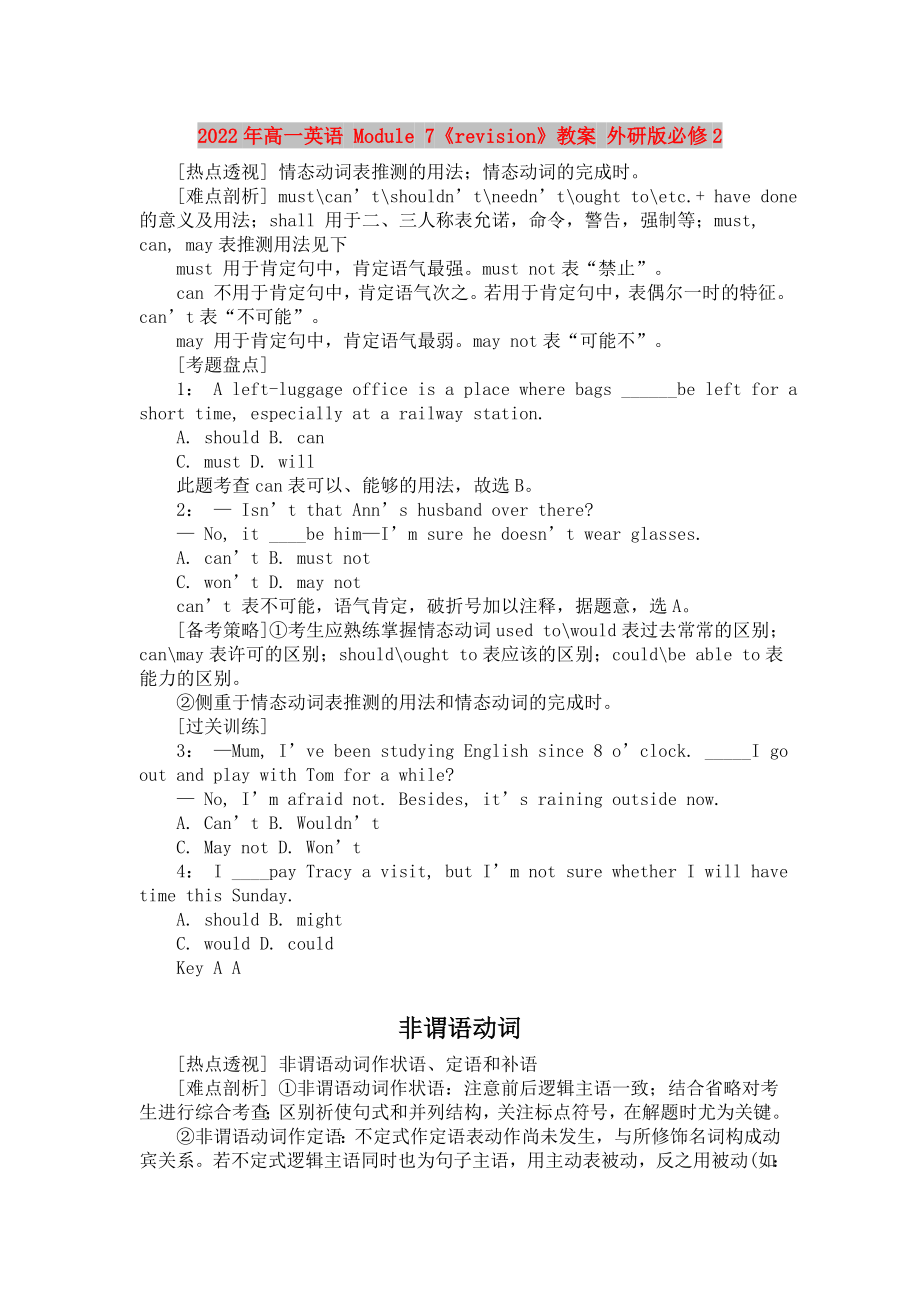《2022年高一英語(yǔ) Module 7《revision》教案 外研版必修2》由會(huì)員分享,可在線(xiàn)閱讀�����,更多相關(guān)《2022年高一英語(yǔ) Module 7《revision》教案 外研版必修2(2頁(yè)珍藏版)》請(qǐng)?jiān)谘b配圖網(wǎng)上搜索。
1��、2022年高一英語(yǔ) Module 7《revision》教案 外研版必修2
[熱點(diǎn)透視] 情態(tài)動(dòng)詞表推測(cè)的用法����;情態(tài)動(dòng)詞的完成時(shí)。
[難點(diǎn)剖析] must\can’t\shouldn’t\needn’t\ought to\etc.+ have done 的意義及用法����;shall 用于二、三人稱(chēng)表允諾�,命令,警告���,強(qiáng)制等����;must, can, may表推測(cè)用法見(jiàn)下
must 用于肯定句中�����,肯定語(yǔ)氣最強(qiáng)�����。must not表“禁止”。
can 不用于肯定句中���,肯定語(yǔ)氣次之��。若用于肯定句中��,表偶爾一時(shí)的特征���。can’t表“不可能”。
may 用于肯定句中�,肯定語(yǔ)氣最弱。m
2���、ay not表“可能不”。
[考題盤(pán)點(diǎn)]
1: A left-luggage office is a place where bags ______be left for a short time, especially at a railway station.
A. should B. can
C. must D. will
此題考查can表可以�����、能夠的用法����,故選B。
2: — Isn’t that Ann’s husband over there?
— No, it ____be him—I’m sure he doesn’t wear glas
3����、ses.
A. can’t B. must not
C. won’t D. may not
can’t 表不可能����,語(yǔ)氣肯定�����,破折號(hào)加以注釋?zhuān)瑩?jù)題意���,選A��。
[備考策略]①考生應(yīng)熟練掌握情態(tài)動(dòng)詞used to\would表過(guò)去常常的區(qū)別�;can\may表許可的區(qū)別����;should\ought to表應(yīng)該的區(qū)別;could\be able to表能力的區(qū)別����。
②側(cè)重于情態(tài)動(dòng)詞表推測(cè)的用法和情態(tài)動(dòng)詞的完成時(shí)��。
[過(guò)關(guān)訓(xùn)練]
3: —Mum, I’ve been studying English since 8 o’clock. _____I go out an
4�、d play with Tom for a while?
— No, I’m afraid not. Besides, it’s raining outside now.
A. Can’t B. Wouldn’t
C. May not D. Won’t
4: I ____pay Tracy a visit, but I’m not sure whether I will have time this Sunday.
A. should B. might
C. would D. could
Key A A
非謂語(yǔ)動(dòng)詞
[熱點(diǎn)透視] 非謂語(yǔ)動(dòng)詞
5�����、作狀語(yǔ)���、定語(yǔ)和補(bǔ)語(yǔ)
[難點(diǎn)剖析] ①非謂語(yǔ)動(dòng)詞作狀語(yǔ):注意前后邏輯主語(yǔ)一致;結(jié)合省略對(duì)考生進(jìn)行綜合考查�;區(qū)別祈使句式和并列結(jié)構(gòu),關(guān)注標(biāo)點(diǎn)符號(hào)����,在解題時(shí)尤為關(guān)鍵。
?����、诜侵^語(yǔ)動(dòng)詞作定語(yǔ):不定式作定語(yǔ)表動(dòng)作尚未發(fā)生�,與所修飾名詞構(gòu)成動(dòng)賓關(guān)系。若不定式邏輯主語(yǔ)同時(shí)也為句子主語(yǔ)����,用主動(dòng)表被動(dòng)�����,反之用被動(dòng)(如:I’m leaving on business. Do you have anything to be taken there?),另還需注意不及物動(dòng)詞加介詞��;現(xiàn)在分詞作定語(yǔ)表動(dòng)作正在進(jìn)行或習(xí)慣性經(jīng)常性動(dòng)作���;過(guò)去分詞作定語(yǔ)表動(dòng)作完成��,與所修飾名詞構(gòu)成動(dòng)賓關(guān)系�����。
?��、鄯侵^語(yǔ)動(dòng)詞作補(bǔ)語(yǔ):
6、能后跟非謂語(yǔ)動(dòng)詞作賓補(bǔ)的動(dòng)詞數(shù)量有限��,格外注意使役動(dòng)詞和感官動(dòng)詞�����;為增加試題的干擾性���,將賓語(yǔ)和補(bǔ)語(yǔ)分離改作定語(yǔ)從句的先行詞(如:The managers discussed the plan that they would like to see carried out the next year.)或?qū)⒆髻e補(bǔ)改作主補(bǔ)(如:The missing boys were last seen playing near the river.)���;注意“with+ n.\pron.+補(bǔ)語(yǔ)”結(jié)構(gòu)的用法�。
?���、軇?dòng)詞不定式作狀語(yǔ)、定語(yǔ)時(shí)��,注意避開(kāi)定向思維的干擾���。
例 Which do you enjo
7、y to kill your spare time—watching TV or playing football?
?���、菀蓡?wèn)詞+to do 的用法。
例 It is said that in Australia there is more land than the government knows what to do with it.
[考題盤(pán)點(diǎn)]
28. The research is so designed that once ____nothing can be done to change it.
A. begins B. having begun
8�����、 C. beginning D. begun
此題結(jié)合省略考查過(guò)去分詞的用法���,完整的從句為once it was begun,故選D�����。
29. A cook will be immediately fired if he is found _____in the kitchen.
A. smoke B. smoking
C. to smoke D. smoked
現(xiàn)在分詞作主補(bǔ)�����,是find+n.+doing sth的變形�,故選B����。
[備考策略] 明辨關(guān)系,看動(dòng)作進(jìn)展�,充分考慮時(shí)態(tài)和語(yǔ)態(tài)�����,慎重選擇三種形式�。
[過(guò)關(guān)訓(xùn)練]
30. _____in
9��、the queue for half an hour, Tom suddenly realized that he had left his wallet at home.
A. To wait B. Have waited
C. Having waited D. To have waited
31. The disk, digitally ____in the studio, sounded fantastic at the party that night.
A. recorded B. recording
C. to be recorded D. having recorded
Key:C A
 2022年高一英語(yǔ) Module 7《revision》教案 外研版必修2
2022年高一英語(yǔ) Module 7《revision》教案 外研版必修2

